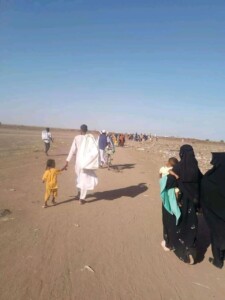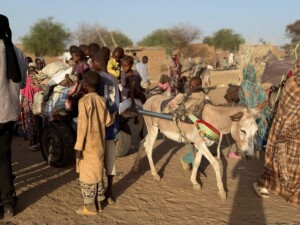Op-ed: Darfur… the bleeding wound
For two decades, Darfur has been groaning and bleeding. It was inhabited by death and destruction, and in its bloody conflicts, foul fire spread to burn the tribe’s youth alive, in the worst manifestations of ethnic and racial obsession, and in light of the enforced disappearance of the rule of law, and the complete absence of the state and its institutions.
 Displaced Darfuri women and girls (File Photo)
Displaced Darfuri women and girls (File Photo)
By Dr Shafee Khader Saeed
For two decades, Darfur has been groaning and bleeding. It was inhabited by death and destruction, and in its bloody conflicts, foul fire spread to burn the tribe’s youth alive, in the worst manifestations of ethnic and racial obsession, and in light of the enforced disappearance of the rule of law, and the complete absence of the state and its institutions.
The news coming from West Darfur state talks about an attack by armed tribal militias, under the cover of artillery fire and heavy weapons, on the town of Kereinik, east of the city of El Geneina, the state capital, which is also engulfed by fire and the attacking militias have robbed them, killing, beating and being taken to unknown places, and in a racist manner, everyone who encounters it, including teachers and medical staff. Hundreds of corpses and wounded people, mostly children, women and the elderly, were piled up in the roads, and thousands of displaced people fled the Holocaust, and homes were completely destroyed and burned, so that it is difficult to deny that what happened was a war of genocide and ethnic cleansing, and it is difficult to agree that the main reason for the outbreak of fighting is The attacking group avenged the killing of two of its sons. In fact, those who limit the conflict in the Darfur region only to its traditional tribal character are mistaken, and those who deny this character are mistaken.
It is the mistake of those who chronicle the beginnings of the conflict in the region with the Salvation Government seizing power, and the mistake of those who ignore the role of the policies, practices and abuses of this government in exacerbating the conflict and turning it into a bloody human tragedy that established the world and did not stop it yet. Those who had the illusion, in good faith, that the signing of peace agreements and the decline of military operations in the region, mean the end of the crisis is very mistaken. Tribal conflicts in Sudan have transformed from a mere conflict of tribes over wasted resources, to a legitimate aspiration for real participation in power and a fair sharing of wealth, especially since these tribes reside in the centres of production of this wealth and the production of economic surplus. This is the case of the crisis in Darfur, where, despite its specificity and geographical space, it is an extension of the general national crisis that has extended since the dawn of independence, which has been exacerbated and complicated by inadequate and wrong treatments at the hands of the social forces that formed the civil and military regimes that have succeeded in ruling over the past decades.
The interests of the country, and in short, a country sliding rapidly towards the abyss, including the abyss of fragmentation with the rising voices demanding, or threatening, the right to self-determination, as stated by the leaders of the betrayed groups that were attacked by militias in El Geneina and the town of Kereink, as a reaction to the failure of the central government and security services From imposing the prestige of the state and protecting civilians, and calling on the international community to provide protection. These leaders insist that the militias that carried out the attack are groups that cross the region, states and borders, which means that the inaction of the central government extends to compromising national sovereignty, and this is a matter that must be taken into account firmly.
The former, and linking all of this to the issues to be discussed in the National Constitutional Conference, which is entrusted with answering the crucial questions related to building the Sudanese state and making the permanent constitution. We see in all this the appropriate approach to addressing what has been repeated in all communications and political statements related to the national crisis in Sudan, about addressing the “roots of the Sudanese problem, and treating the causes of the civil war from its roots.”
The bloody events in West Darfur will not be the last, and the proposed treatments have been tried before, and the bleeding has not stopped. That is why we support the proposal of the “Darfur Bar Association” to form a national committee to address this great strife.
Disclaimer:
The views and opinions expressed in this article are those of the contributing media and/or author and do not necessarily reflect the position of Radio Dabanga.
Source: This article was initially published by alquds.co.uk
 Dr Shafee Khader Saeed is a Sudanese writer and activist.
Dr Shafee Khader Saeed is a Sudanese writer and activist.











 and then
and then